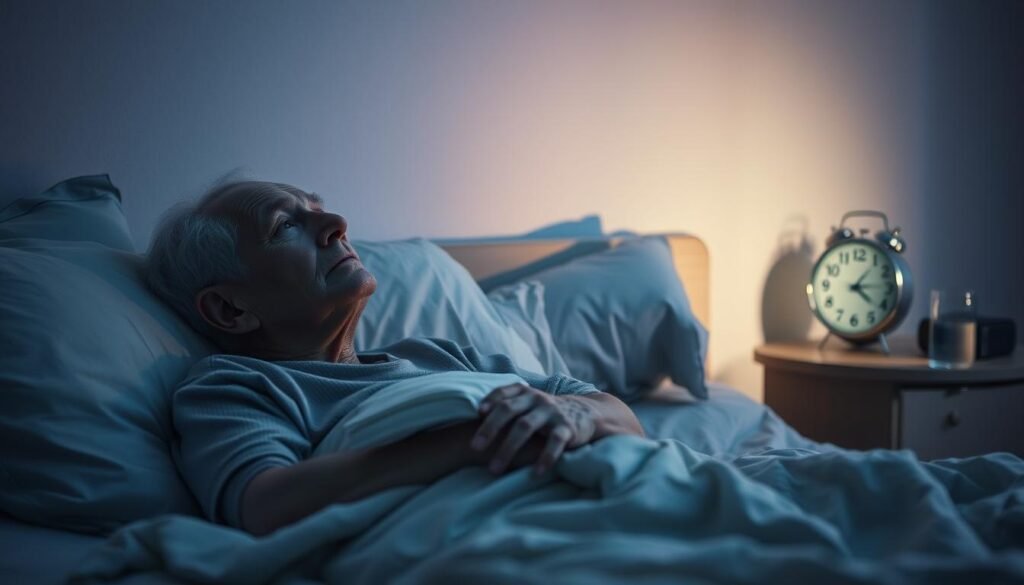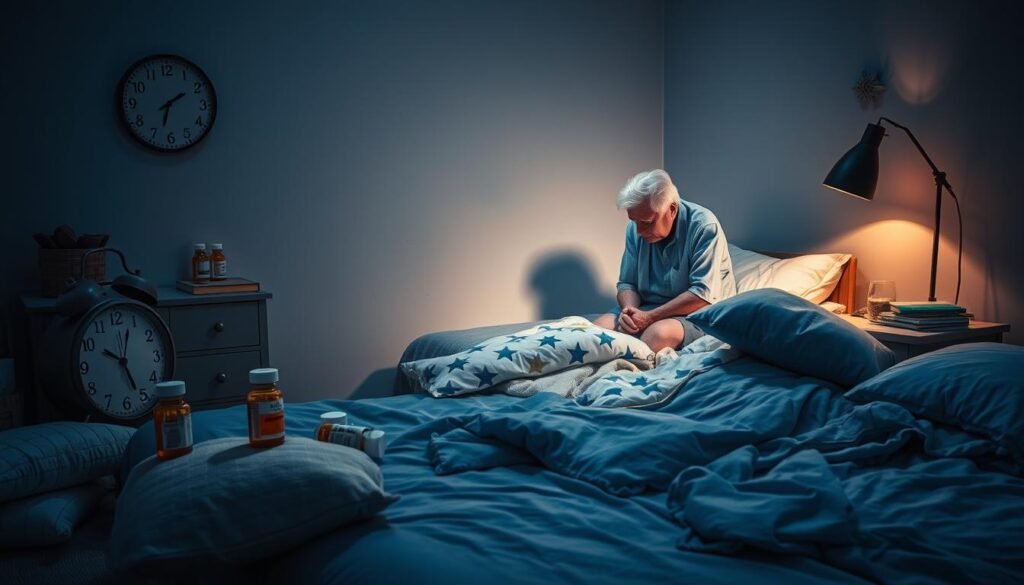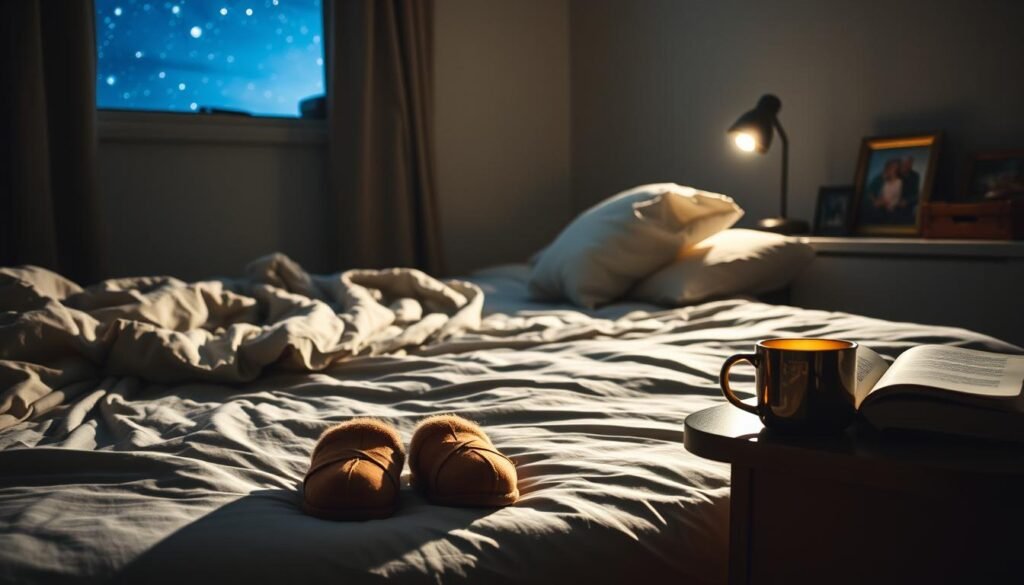Between a quarter and a third of seniors over 65 face insomnia. For those with dementia, up to half struggle with it. This issue ruins their night’s sleep and affects their lives in many ways. We must understand how lack of sleep hits the elderly. It can hurt their thinking, emotions, and physical health.
The number of elderly people is going to grow soon. So, it’s key to know the problems insomnia causes them. This piece looks at how sleep troubles affect seniors’ well-being. It stresses the need for good sleep habits. Insomnia can cause big health issues like high blood pressure and anxiety. This study talks about how to spot and fix these sleep problems.
Key Takeaways
- Insomnia hits 10 to 30% of adults, more so in seniors.
- It’s linked to thinking problems and mood issues in older folks.
- Managing sleep better can help seniors live better.
- It can also cause big health issues like high blood pressure and depression.
- Behavior therapy and sleep hygiene are advised treatments.
The Prevalence of Insomnia in Older Adults
Many older adults struggle with insomnia. This affects their well-being and life quality deeply. Between 30% and 48% of them face insomnia, making it a common issue. They find starting and maintaining sleep difficult, causing serious problems. Many factors lead to this widespread issue.
Understanding the Statistics
About half of older adults have insomnia symptoms, especially those over 60. Factors like environment, behavior, and health affect its development. Conditions like diabetes and heart disease can increase the risk. Sleep maintenance problems are particularly common, affecting 50% to 70% of older individuals.
Age-Related Changes in Sleep Architecture
As we age, our sleep patterns change, resulting in less deep and REM sleep. These changes cause shorter sleep and more waking moments at night. Many older adults find themselves sleeping early and waking at dawn. However, those with insomnia may face even more disrupted sleep patterns.
| Insomnia Symptoms | Prevalence Rate (%) |
|---|---|
| Difficulty Initiating Sleep | 35 – 60 |
| Sleep Maintenance Issues | 50 – 70 |
| Nonrestorative Sleep | 20 – 25 |
How Insomnia Affects Daily Life in the Elderly
Insomnia changes life a lot for older people. It affects their mind, feelings, and body health. This sleep problem can make it hard to think clearly. It also makes them feel upset or sad and can cause health issues. Attention and care are needed to help with these problems.
Cognitive Impairments Linked to Sleep Disruption
Seniors with insomnia often have trouble thinking and remembering things. They find it hard to focus and keep memories. Studies show that not sleeping well makes these issues worse. This can make daily chores and decisions challenging. It’s important to find ways to help them sleep better.
Emotional and Mood Disturbances
Insomnia can make older adults feel very anxious, sad, or easily annoyed. This can make it tough for them to be around others. They might avoid social events and feel lonely. These feelings can harm their overall happiness. Solving sleep problems is key to improving their mood.
Impact on Physical Health and Well-Being
Not sleeping enough can cause many health problems. This includes heart issues, becoming overweight, and memory problems. Elderly people with insomnia might get hurt more easily because they are not as alert or coordinated. It’s hard to stay healthy without enough sleep. Getting 7 to 9 hours of sleep is vital.
Helping elders with insomnia is very important. It’s not just about more sleep. It’s about making their life better. Understanding how sleep affects their mind, feelings, and health helps us find good solutions. This way, we can improve the lives of seniors dealing with insomnia.
Common Insomnia Symptoms in Seniors
Seniors often face unique insomnia symptoms, impacting their day-to-day life. It’s vital to identify these signs for timely treatment. This help improves sleep disorders management in older people.
Difficulty Falling Asleep
Many seniors find it hard to sleep at night. Factors like chronic pain or anxiety can make this tougher. This issue can cause frustration and more tiredness during the day.
Frequent Night Awakenings
Night awakenings are a widespread problem. Most seniors over 65 experience disturbed sleep. These disruptions make it hard to get deep sleep, leading to morning tiredness.
Excessive Daytime Sleepiness
A lot of older people with insomnia feel very sleepy in the daytime. This affects their focus and energy. Waking up often at night and sleep problems can reduce their life’s quality.

Potential Causes of Sleep Disorders in Seniors
Sleep problems in older adults come from many factors. It’s key to know what causes these issues. Elderly insomnia causes get more complicated as we age. This is due to physical and mental changes. Figuring out the reasons helps manage sleep better.
Medical Conditions Contributing to Insomnia
Many medical issues can cause sleep problems in seniors. Arthritis, heart diseases, and lung problems are common causes. These issues can cause pain, making it hard to sleep. Problems like heart failure or brain disorders can make sleep troubles worse. To learn more, check out this full article.
Psychiatric Disorders and Insomnia
Anxiety and depression affect sleep in seniors. The loss of someone close can make this worse. It’s not rare for these emotional stressors to lower sleep quality. This makes health and well-being even more complex for them.
Behavioral Factors Affecting Sleep Quality
Behavior significantly impacts sleep. Many seniors change their lifestyle after retiring, affecting their sleep. Bad habits, like too much caffeine or not exercising, can harm sleep quality. Sticking to a sleep schedule helps, as does a peaceful bedroom. Beds should only be for sleep and closeness. These steps can help improve sleep at night.

Impact of Insomnia on Aging Adults
Chronic insomnia can greatly affect older adults’ daily lives. It makes day-to-day living hard due to a lack of restful sleep. Insomnia often causes problems with thinking and moving, which can reduce independence and life quality.
Effects on Daily Functioning
Insomnia makes many older people feel very tired. This tiredness makes it hard to do everyday tasks and think clearly. Tasks become harder, and mood swings like anxiety and depression can happen. These issues may lead to feeling alone because being social feels too tough.
Risks of Falls and Accidents
Chronic insomnia increases the risk of falls among the elderly. Being less alert and coordinated leads to more accidents and injuries. Some sleep medicines can make things worse by causing drowsiness. Sleep-deprived seniors are more at risk of falling, even in places they know well.

Managing Insomnia in Older Adults
There are good ways to help older adults sleep better without using drugs. These methods teach about sleep and help set up good sleep habits. This gives seniors a strong base to improve their sleep.
Non-Pharmacological Approaches
Building a healthy sleep routine can really help with insomnia. Some important parts include:
- Consistent Sleep Schedule: It helps to go to bed and wake up at the same time every day.
- Sleep Environment: Having a bedroom that’s cool, dark, and quiet can make sleeping easier.
- Limiting Stimulants: Stay away from caffeine and nicotine before bedtime.
- Physical Activity: Being active during the day can help you sleep better at night.
Behavioral Interventions and Cognitive Behavioral Therapy
Cognitive Behavioral Therapy for insomnia (CBT-I) is very effective for many seniors. It helps change negative thoughts and behaviors about sleep. Important parts include:
- Stimulus Control Therapy: This method makes the bed a cue for sleep, reducing awake time in bed.
- Sleep Restriction: Only spend time in bed when actually sleeping to strengthen sleep.
- Education: Teaching seniors about how sleep works helps them understand insomnia better.
Using these methods can make sleep habits better for seniors. This can really help in dealing with insomnia in older adults.
Insomnia Treatment for the Elderly
Helping older adults with insomnia means looking at different treatment ways. A lot of the elderly in the U.S., 57%, face chronic insomnia. So it’s key to know the right insomnia treatment for the elderly to make their life better. Psychological and behavioral therapies are usually tried first. But, medication might be needed if these don’t work.
Pharmacological Options and Cautions
Choosing the right medicine for insomnia is all about safety and how well it works. The list includes:
- Orexin agonists
- Histamine receptor antagonists
- Benzodiazepines
- Non-benzodiazepine gamma-aminobutyric acid receptor agonists
For those who struggle to fall asleep, Z-drugs and Ramelteon are suggested. To stay asleep longer, Suvorexant or low-dose doxepin help. Eszopiclone and extended-release zolpidem help with both falling and staying asleep.
It’s important to be careful though. Benzodiazepines are risky due to possible dependence and more falls. Doctors might use trazodone or melatonin instead, but they need to watch how these work closely.
Consultation and Personalized Care Plans
Creating care plans just for them is important. This makes sure treatments match individual needs while keeping medication risks low. Regular check-ups help doctors measure how bad the insomnia is.
Cognitive-behavioral therapy (CBT) is also a strong option. It can be just as, or even more, effective than sleeping pills for many people.
In sum, tackling insomnia in the elderly needs a combined approach. This approach uses both drugs and proven therapies. By doing this, we can better the sleep and overall life of older adults.
Importance of Sleep Hygiene for Seniors
Good sleep hygiene is key for seniors’ health and happiness. Many older adults struggle with sleep issues. Knowing how to improve sleep hygiene is crucial. It improves sleep quality, making seniors feel more rested and full of energy.
Creating a Conducive Sleep Environment
To get better sleep, the environment is important. Seniors should have a dark, quiet, and cool bedroom. These conditions lead to better sleep by reducing interruptions.
Comfy bedding and blackout curtains help block out light and noise. The bedroom’s atmosphere affects sleep quality. Making these changes can help a lot.
Developing Healthy Sleep Habits
Having a regular sleep schedule helps the body’s clock. Seniors should sleep and wake at the same time every day, even on weekends. Staying away from screens and big meals before bed helps too.
Relaxing activities before bed, like reading or gentle yoga, can also help. These tips show how crucial good sleep hygiene is for seniors. For more tips on good sleep, check out the National Institute on Aging.
Conclusion
Insomnia in older adults deeply affects their mind, emotions, and body health. It’s more than a small problem—it brings big challenges. Nearly 75% of older people have insomnia signs. So, knowing what causes their sleep issues is crucial.
It’s vital for families, caregivers, and health workers to use good strategies against insomnia. Good sleep practices and treatments like cognitive therapy help a lot. They improve sleep, which makes older people healthier and happier.
Research finds that over 90% of seniors have had sleep issues for at least a year. This shows we need to step in and help. By learning from studies on insomnia causes, folks can build better sleep habits. With the right attention and methods, seniors can get back good sleep and a better life.